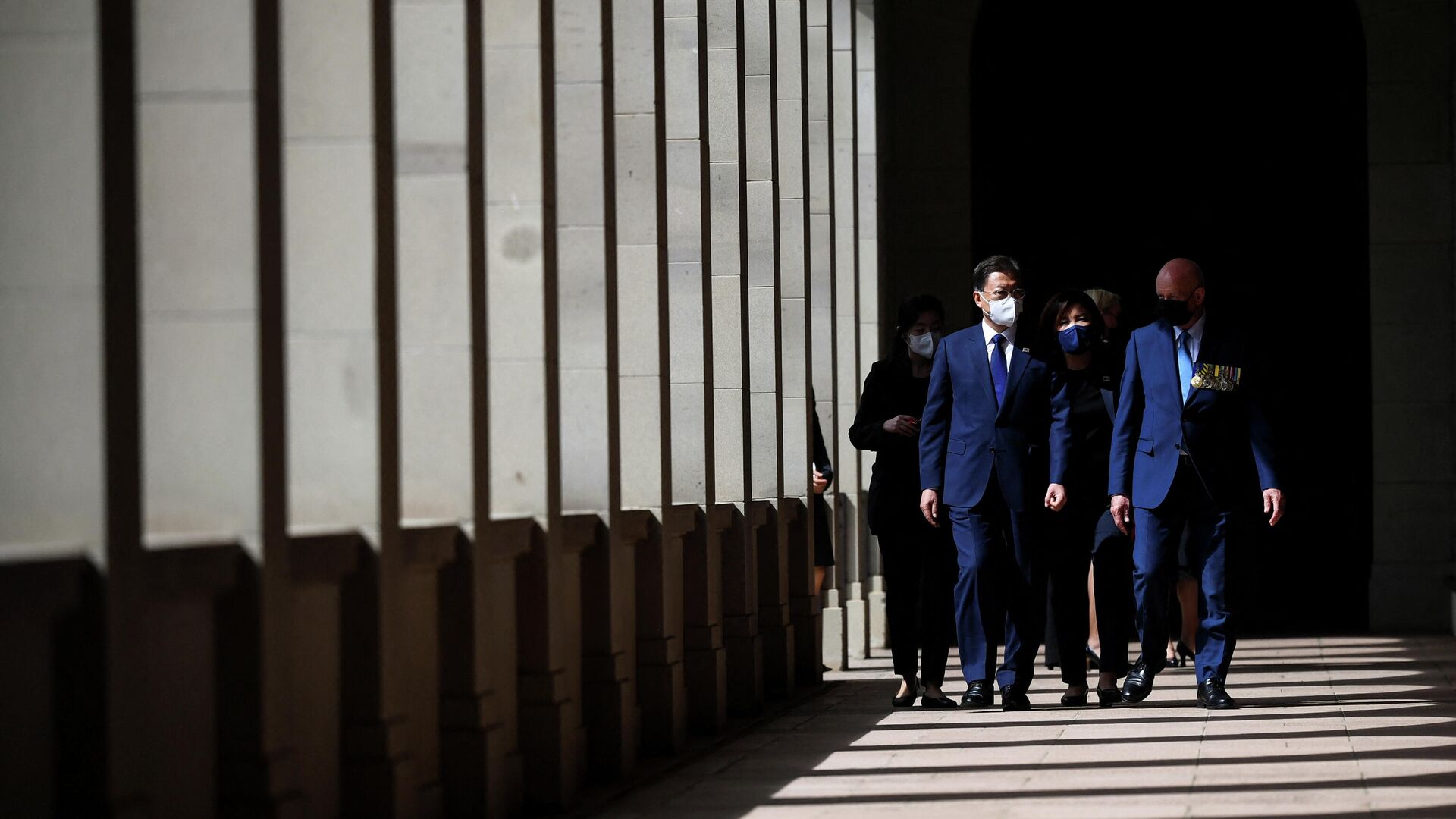https://sputnikglobe.com/20211213/us-china-and-koreas-agree-in-principle-to-put-formal-end-to-korean-war-decades-after-conflict-1091487082.html
US, China and Koreas Agree 'in Principle' to Put Formal End to Korean War Decades After Conflict
US, China and Koreas Agree 'in Principle' to Put Formal End to Korean War Decades After Conflict
Sputnik International
The Korean War took place from 25 June 1950 to 27 July 1953. The last day of the war was marked with an armistice, but no peace treaty has been signed even up to this day.
2021-12-13T14:01+0000
2021-12-13T14:01+0000
2023-09-18T13:36+0000
south korea
us
asia
china
war
north korea
https://cdn1.img.sputnikglobe.com/img/07e5/0c/0d/1091487601_0:160:3073:1888_1920x0_80_0_0_47ee83550a5db94dc83a3fb86aaf5605.jpg
Washington, Seoul, Beijing, and Pyongyang have agreed "in principle" to formally end the Korean War, South Korea's President Moon Jae-in said on Monday.He revealed the intention during his four-day visit to the Australian capital Canberra. However, there are certain hitches on the way to a peace declaration. The South's president said that North Korea appears to be holding back the negotiations on a formal end to the war due to current "US hostility".According to the South Korean president, efforts to boost the negotiations are being made. Moon underlined the importance of ending the "unstable" armistice, saying that a peace agreement could ensure progress on the issue of Pyongyang's nuclear programme."This is going to help us start negotiations for denuclearisation and peace … [on] the Korean Peninsula”, he said. “This is very important on that front as well”.Moon delivered his remarks on the developments during a press conference with Australian Prime Minister Scott Morrison. Shortly after that, South Korean Unification Minister Lee In-young urged North Korea to cooperate on a peace declaration.Still, Pyongyang demanded "a prerequisite that the US should fundamentally drop its hostile policy", apparently referring to some 28,500 American troops in South Korea and annual joint military drills between Washington and Seoul - something that North Korea views as an aggressive act.However, the idea of withdrawing troops from South Korea before Pyongyang agrees to denuclearise does not appear to sit well with Washington. In early December, House Republicans voiced concerns over a possible peace declaration that would formally end the Korean War.Pyongyang and Seoul technically remain at war, since no peace declaration followed the armistice that was signed in 1953. The military conflict between the two Koreas began on 25 June 1950 and de facto ended on 27 July 1953.
south korea
china
north korea
Sputnik International
feedback@sputniknews.com
+74956456601
MIA „Rosiya Segodnya“
2021
News
en_EN
Sputnik International
feedback@sputniknews.com
+74956456601
MIA „Rosiya Segodnya“
Sputnik International
feedback@sputniknews.com
+74956456601
MIA „Rosiya Segodnya“
korean war, south korea, north korea, war between south korea and north korea, are south korea and north korea at war?, moon jae-in,
korean war, south korea, north korea, war between south korea and north korea, are south korea and north korea at war?, moon jae-in,
US, China and Koreas Agree 'in Principle' to Put Formal End to Korean War Decades After Conflict
14:01 GMT 13.12.2021 (Updated: 13:36 GMT 18.09.2023) The Korean War took place from 25 June 1950 to 27 July 1953. The last day of the war was marked with an armistice, but no formal peace treaty has been signed to this day.
Washington, Seoul, Beijing, and Pyongyang have agreed "in principle" to formally end the Korean War, South Korea's President Moon Jae-in said on Monday.
He revealed the intention during his four-day visit to the Australian capital Canberra. However, there are certain hitches on the way to a peace declaration. The South's president said that North Korea appears to be holding back the negotiations on a formal end to the war due to current "US hostility".
“And because of that, we are not able to sit down for a negotiation on the declarations between South and North Korea, and those between North Korea and [the] United States”, Moon said, describing the "significant dialogue momentum" between the countries.
According to the South Korean president, efforts to boost the negotiations are being made. Moon underlined the importance of ending the "unstable" armistice, saying that a peace agreement could ensure progress on the issue of Pyongyang's nuclear programme.
"This is going to help us start negotiations for denuclearisation and peace … [on] the Korean Peninsula”, he said. “This is very important on that front as well”.
Moon delivered his remarks on the developments during a press conference with Australian Prime Minister Scott Morrison. Shortly after that, South Korean Unification Minister Lee In-young urged North Korea to cooperate on a peace declaration.
“North Korea has been seemingly showing a more open manner towards dialogue than before”, Yonhap news agency quoted Lee as saying. "North Korea has fired multiple short-range missiles this year but it hasn’t made the situation deteriorate severely by raising tensions to a high level”.
Still, Pyongyang demanded "a prerequisite that the US should fundamentally drop its hostile policy", apparently referring to some 28,500 American troops in South Korea and annual joint military drills between Washington and Seoul - something that North Korea views as an aggressive act.
However, the idea of withdrawing troops from South Korea before Pyongyang agrees to denuclearise does not appear to sit well with Washington. In early December, House Republicans
voiced concerns over a possible peace declaration that would formally end the Korean War.
"We are gravely concerned that this declaration, instead of promoting peace, would seriously undermine and destabilise the security of the Korean peninsula", the GOP lawmakers said in their letter to White House National Security Adviser Jake Sullivan.
Pyongyang and Seoul technically remain at war, since no peace declaration followed the armistice that was signed in 1953. The military conflict between the two Koreas began on 25 June 1950 and de facto ended on 27 July 1953.




